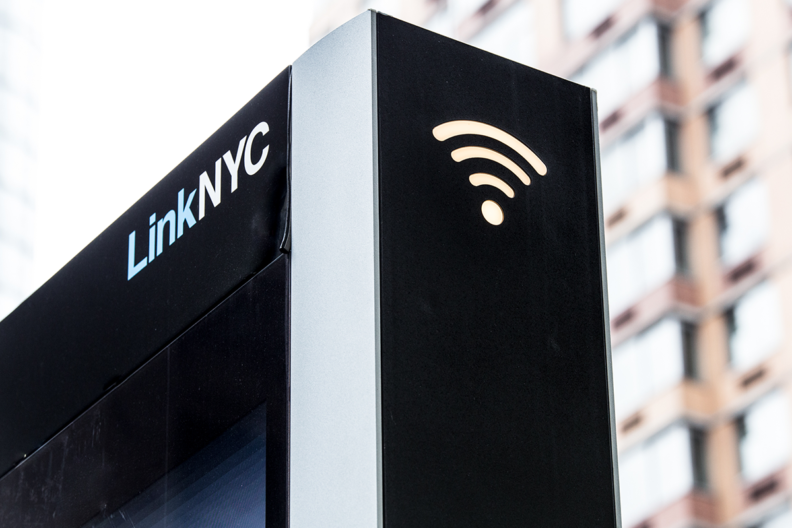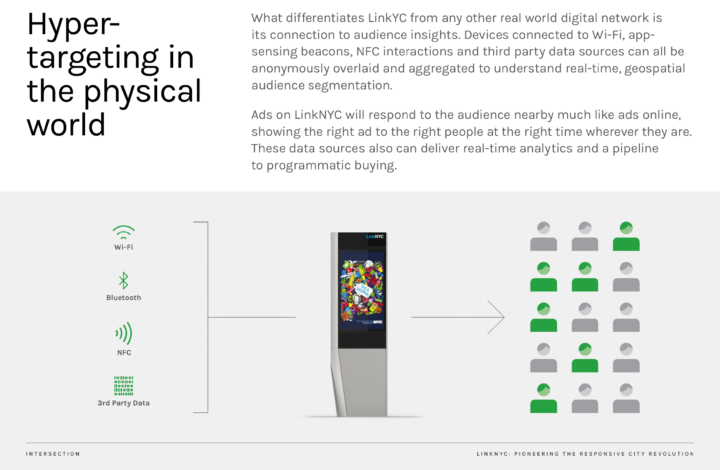LinkNYC is a Privacy Disaster. Here’s Why
We need a public alternative that provides high-speed universal Internet access.

From its inception, LinkNYC – the public WiFi kiosks that are run by a consortium of companies including Google subsidiary Sidewalk Labs – have always posed a threat to privacy. But after nine years of operation and a recent audit, it’s fair to say LinkNYC represents a barely mitigated privacy disaster. The project puts the personal information of millions of New Yorkers at serious risk and primarily sees the public as walking targets for adverting.
LinkNYC’s promoters promised the kiosks would usher in a new era of greater Internet access, particularly for poor people of color. We heard that LinkNYC was a critical tool in the effort to reduce the digital divide between wealthy people with reliable, high-speed access, and those without it. But there is minimal evidence LinkNYC has helped with this worthy endeavor, and the majority of the kiosks are located in wealthier areas. It’s also not a meaningful solution given its limited reach and focus on providing Internet in the streets rather than in homes.
While failing to live up to the goal of broadening Internet access, LinkNYC’s funders have repeatedly made privacy protections an afterthought. After the NYCLU raised serious concerns, LinkNYC’s privacy policy was amended in 2017. But it hasn’t been amended since, and it remains too vague and opaque.
Worse still, a recent audit commissioned by the City’s Office of Technology and Innovation (OTI) revealed that CityBridge – the consortium behind LinkNYC – repeatedly violated its own privacy policy. Among other issues, the audit shows CityBridge failed to anonymize MAC addresses of user devices. MAC addresses are unique identifiers assigned to each network device and they can be used to identify and track the devices, or the people using them, over time.
Beyond issues with the privacy policy, there is still a lot we don’t know about what information LinkNYC kiosks are sucking up. We also don’t know who has access to that information, how CityBridge is utilizing other third-party data to target people, and what’s being done with that treasure trove of personal data.
Each kiosk is equipped with multiple technologies, including WiFi, Bluetooth, video cameras, and many sensors that can track people or devices. They allow for vast surveillance powers including the ability to follow our movements whether we affirmatively connect to the network or not.
This means nearly every New York City resident could have their location and other personal information harvested, whether they take advantage of LinkNYC or not. And the high density of LinkNYC kiosks across the City can result in detailed location information about people’s commutes, habits, and associations. These surveillance powers are not being deployed by accident. They are core features of the underlying business model, as Intersection’s own presentations make painfully clear.

While the NYCLU and other privacy advocates have raised concerns for years about LinkNYC, it’s the project backers’ own words that are perhaps most alarming. Intersection promises advertisers highly detailed “audience insights” and says the kiosks allow for “hypertargeting in the physical world.” Promotional materials pledge that “Ads on LinkNYC will respond to the audience nearby much like ads online, showing the right ad to the right people at the right time wherever they are.” In another presentation, Intersection goes into further detail stating they:
… can reliably deliver impressions from these desired audiences (i.e. ages 18 – 34, college graduates, high-income, or a profile combining all of these attributes) by leveraging demographic data and location-based information. Our wide range of assets ensures that we can satisfy nearly any advertiser’s demands for certain audiences, whether they be large or niche.
Sadly, we have all likely become accustomed to the idea that we are surveilled by various companies while we search the Internet or use our phones. But there is still something uniquely unsettling about a government-approved “public” project that forces New Yorkers to give up their information whether they use LinkNYC or not.
We need a publicly funded and controlled municipal broadband program that ensures every New Yorker, regardless of who they are or how much money they have, can enjoy high-speed, reliable Internet access. This program must put our privacy rights front-and-center so they aren’t traded away to the highest bidder. And the New York Legislature must pass the Digital Fairness Act which would create comprehensive privacy protections where companies must acquire people’s informed, affirmative consent before they collect or use their personal information and can no longer circumvent our civil and human rights laws.
